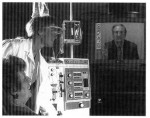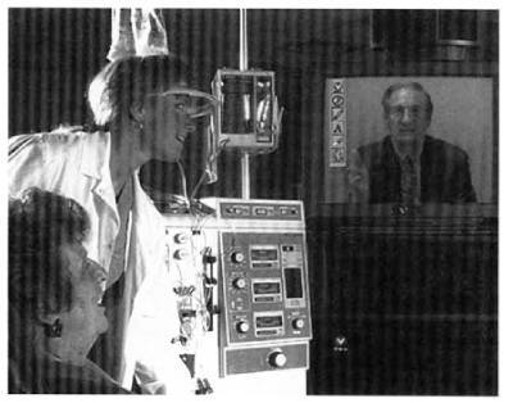
 Telemedicine consultation from the patient's perspective. In Telemedicine: A Guide to Assessing Telecommunications in Health Care. National Academies Press (US); 1996.The health crisis linked to the Covid-19 epidemic has given a new impetus to the development of mental health care provision via teleconsultations.
Telemedicine consultation from the patient's perspective. In Telemedicine: A Guide to Assessing Telecommunications in Health Care. National Academies Press (US); 1996.The health crisis linked to the Covid-19 epidemic has given a new impetus to the development of mental health care provision via teleconsultations.
While these new uses responded to the concern to maintain links with patients during periods of confinement, they also enabled practitioners to assess the possibilities of transposing their usual activities into the new context of practice and, if necessary, to build, step by step, confidence in the new practices.
During teleconsultations, the protagonists are immersed in conditions of videophone interaction where exchanges are to a large extent transformed and take place, at least at first, in a less fluid manner than usual. Professionals can no longer have direct recourse to all the usual techniques of face-to-face psychotherapy. They are deprived of crucial clinical elements usually based on close-up sight, fine hearing, smell and touch. Users are confronted with various impressions of distance, sensory and cognitive, as well as emotional. The loss of a range of “affordances” to support professional judgement increases practitioners' uncertainty about the clinical cases they have to manage. The relative lack of information will be partially compensated by a more sustained attention, which generates more fatigue, and by more questions, leading to a psychotherapeutic posture that tends to be more interventionist and leaves less room for silence. Thanks of efforts and adaptations, practitioners seek and succeed, to a certain extent, in reproducing the conditions for the emergence of clinical intuition and empathy that are at the foundation of the psychotherapeutic relationship. Paradoxically, the distance inherent in teleconsultations sometimes tends to bring the protagonists closer together, as patients tend to open up more quickly than in face-to-face therapy.
Psychotherapists have also had to respond to technical malfunctions that have resulted in poor visual and sound reproduction, or even disconnection. These problems, which give rise to new concerns and require new forms of attention, are of a technical, organisational and clinical nature, and may have an economic and moral dimension linked to the payment of psychotherapy sessions which have been greatly disrupted. Practising teleconsultation also means gradually adapting the usual working tools, delaying or restricting their use, and very often giving up some of them, even though they sometimes remain at the heart of the usual practice of face-to-face psychotherapy. At least during the initial period of use, telepractitioners question the degree to which their usual practices can be transposed to the new framework of activity, as well as the efforts and renunciations to which they are prepared to consent in order to carry out such an adaptation. They are also faced with new problems of imputability of the difficulties encountered: are these due to organisational complications that destabilise the therapeutic framework, to problems in interacting via ICTs and establishing a bond of trust with the patient at a distance, or "only" to the difficulties presented by the patient at the clinical level?
Lastly, carrying out teleconsultations sometimes requires the creation of a digital identity involving a staging of oneself on the Web, which is synonymous with both the unveiling of oneself and competition in a new format, within a professional sphere that extends beyond the traditional perimeters.
Taking these numerous phenomena into account allows us to appreciate the full depth of the transformations in psychotherapeutic work that can be observed during teleconsultations. It remains to be seen what practitioners will learn from their experiences, but also to what extent and in what ways they will consider it useful to maintain, in the future, a practice of remote consultation for the benefit of their patients.
Read more : telemedicine and Covid 19
Références :
Alexandre Mathieu-Fritz, Le praticien, le patient et les artefacts. Genèse des mondes de la télémédecine, Presses des Mines, 2021.
Alexandre Mathieu-Fritz, « Les téléconsultations en santé mentale. Ou comment établir la relation psychothérapeutique à distance », Réseaux, vol. 36, n° 207, janvier-février 2018, (pp. 123-164).
To quote this paper : Alexandre Mathieu-Fritz, "Téléconsultations en santé mentale et Covid-19", dans Hervé Guillemain (dir.), DicoPolHiS, Le Mans Université, 2021.